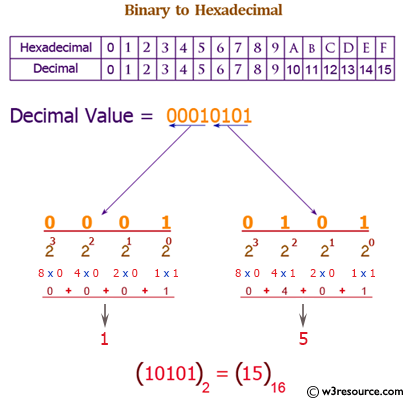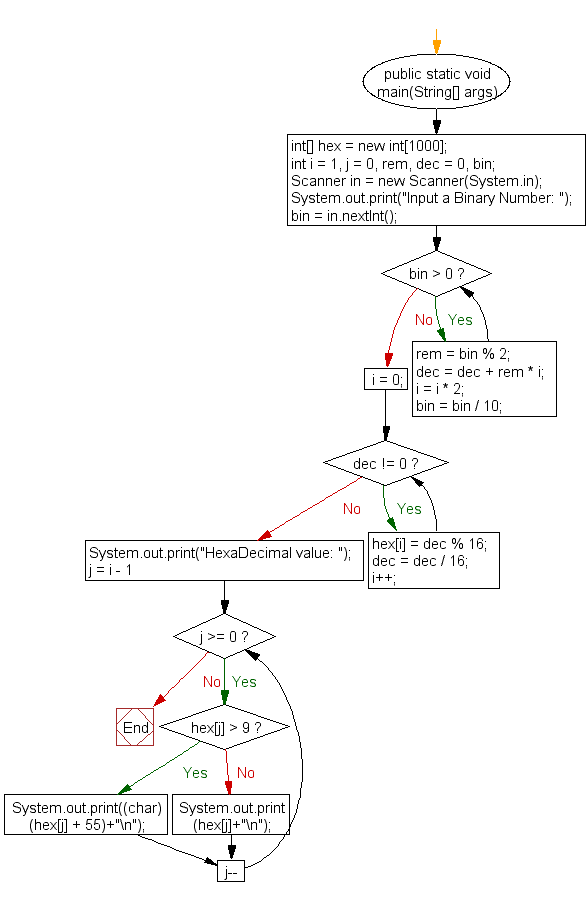Java: Convert a binary number to hexadecimal number
Binary to Hexadecimal Converter
Write a Java program to convert a binary number to a hexadecimal number.
Binary number: A binary number is a number expressed in the base-2 numeral system or binary numeral system. This system uses only two symbols: typically 0(zero) and 1(one).
Hexadecimal number: This is a positional numeral system with a radix, or base, of 16. Hexadecimal uses sixteen distinct symbols, most often the symbols 0-9 to represent values zero to nine, and A, B, C, D, E, F (or alternatively a, b, c, d, e, f) to represent values ten to fifteen.
Test Data:
Input a binary number: 1101
Pictorial Presentation: Binary to Hexadecimal number

Sample Solution:
Java Code:
import java.util.Scanner;
public class Exercise23 {
public static void main(String[] args) {
// Declare an array to store hexadecimal digits, variables for calculation, and binary input
int[] hex = new int[1000];
int i = 1, j = 0, rem, dec = 0, bin;
// Create a Scanner object to read input from the user
Scanner in = new Scanner(System.in);
// Prompt the user to input a binary number
System.out.print("Input a Binary Number: ");
bin = in.nextInt();
// Convert the binary number to decimal
while (bin > 0) {
rem = bin % 2;
dec = dec + rem * i;
i = i * 2;
bin = bin / 10;
}
i = 0;
// Convert the decimal number to hexadecimal
while (dec != 0) {
hex[i] = dec % 16;
dec = dec / 16;
i++;
}
// Display the hexadecimal value
System.out.print("Hexadecimal value: ");
for (j = i - 1; j >= 0; j--) {
if (hex[j] > 9) {
System.out.print((char)(hex[j] + 55));
} else {
System.out.print(hex[j]);
}
}
System.out.print("\n");
}
}
Explanation:
In the exercise above -
- Initializes an array 'hex' to store the hexadecimal digits of the converted number, as well as other necessary variables.
- It takes a binary number as input from the user using the "Scanner" class and stores it in the variable 'bin'.
- It enters a loop to convert the binary number to decimal:
- In each iteration, it calculates the remainder when the 'bin' is divided by 2 (which gives the least significant binary digit).
- It adds this remainder multiplied by 'i' to the 'dec' variable to accumulate the decimal value.
- It multiplies 'i' by 2 to prepare for the next binary digit.
- It updates 'bin' by removing the least significant digit (rightmost) by dividing it by 10.
- The loop continues until 'bin' becomes zero, effectively converting the entire binary number to decimal.
- After converting to decimal, it enters another loop to convert the decimal number to hexadecimal:
- In each iteration, it calculates the remainder when 'dec' is divided by 16 (which gives the least significant hexadecimal digit).
- It stores this remainder in a 'hex' array.
- It updates 'dec' by dividing it by 16 to move to the next hexadecimal digit.
- Finally, it prints the hexadecimal representation of the original binary number by iterating through the 'hex' array in reverse order. It also handles hexadecimal digits greater than 9 by converting them to the corresponding letters A-F.
Sample Output:
Input a Binary Number: 1101 HexaDecimal value: D
Flowchart:

For more Practice: Solve these Related Problems:
- Convert a large binary number (more than 16 bits) to hexadecimal.
- Modify the program to display the hexadecimal equivalent of multiple binary numbers.
- Implement binary-to-hexadecimal conversion without using built-in methods.
- Write a program that converts a binary floating-point number to hexadecimal.
Go to:
PREV : Binary to Decimal Converter.
NEXT : Binary to Octal Converter.
Java Code Editor:
What is the difficulty level of this exercise?
Test your Programming skills with w3resource's quiz.
